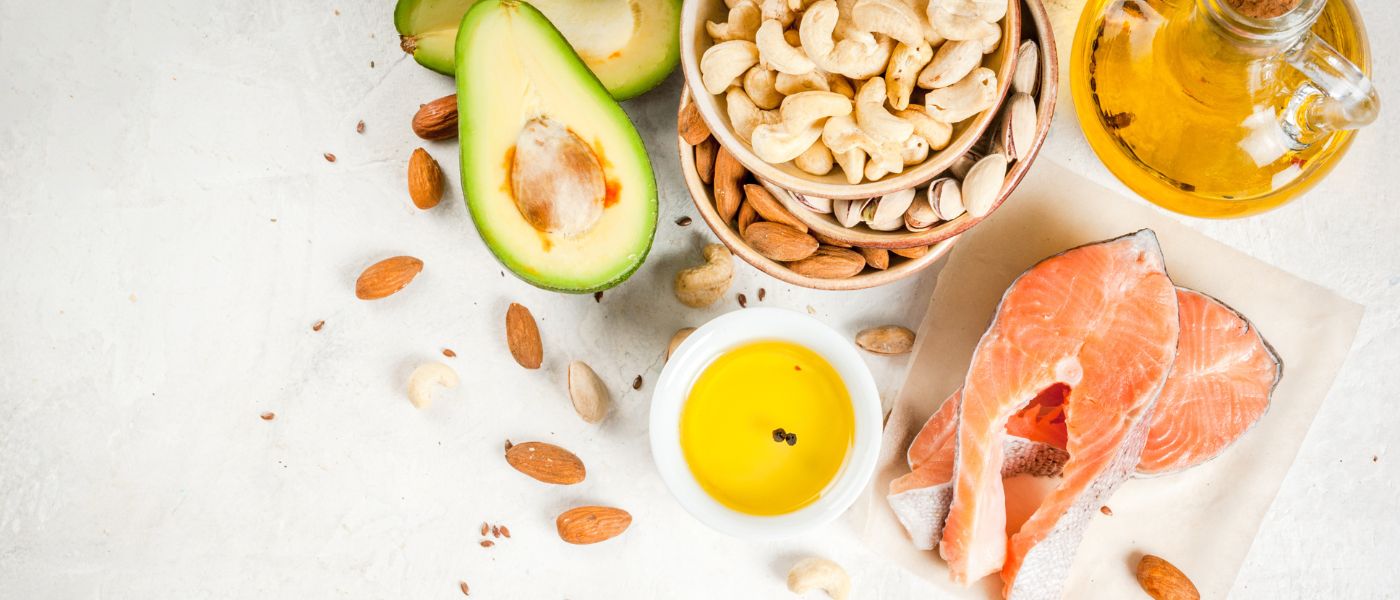Keto Diet Supplements to Feel Your Best During Ketosis
Key Takeaways:
Key Points:
- The ketogenic diet requires your body to burn fat as its main energy source rather than carbohydrates (aka glucose). This method is helpful for weight loss and can also improve neurodegenerative disorders, metabolic health, and mental health.
- One of the main roadblocks to the keto diet is something called “keto flu.” It occurs when your body first makes the transition to burning fat as an energy source. During this time, you may experience 1-2 weeks of body aches, digestive issues, moodiness, cravings, and nausea.
- Keto diet supplements like butyrate, electrolytes, phospholipids, and high-quality fish oil can help mitigate keto flu symptoms and get you results faster.
It’s not just a fad diet.
Dr. Russell Wilder designed the ketogenic diet in the 1920s as a dietary intervention for epilepsy. The results were so promising that keto quickly became a resource for other metabolic and mitochondrial disorders, like diabetes, heart disease, and some neurodegenerative conditions (like Alzheimer's).
Other benefits of the ketogenic diet may include:
- Better microbiome composition
- Weight loss
- Beta-hydroxybutyrate (BHB) production
- Blood sugar regulation
- Clear skin
- Mental clarity
- Chronic illness support
But following the keto diet isn’t for the faint of heart.
The goal is to transition your body from burning carbohydrates to burning fat instead.
This puts your body into ketosis, releasing three essential ketones: acetoacetate, beta-hydroxybutyrate (BHB), and acetone for energy.
Refined sugars and carbohydrates aren’t allowed on the keto diet — even fruits and veggies are only allowed in small portions.
That said, it can certainly be worth overhauling your diet for the metabolic and brain health benefits (especially if your integrative or functional medicine practitioner recommends it).
There are plenty of resources that can ease your transition to the keto diet.
Let’s explore the best keto diet supplements to improve your keto experience.
The Top 10 Keto Diet Supplements We Recommend
If you’re about to start the ketogenic diet, there are big changes on the horizon. The highlights include better blood sugar levels, improved metabolism, and a happier gut microbiome (at least, according to studies).
But like any other restrictive diet, the ketogenic diet has its disadvantages. Especially during the early stages of the diet, nutrient deficiencies and symptoms of “keto flu” are common experiences.
These top ten keto diet supplements can help ease your transition to keto while supporting the promised benefits.
Fish Oil
When switching to a protein- and fat-based diet, you need to become much more conscious of your essential fatty acid intake, especially omega-6s. These are found in high concentrations in nuts, seeds, and seed oils. Omega-6 fatty acids aren’t bad for you, provided they’re responsibly processed and the ideal omega-6 to omega-3 fatty acid ratio for humans is maintained.
Maintaining that ratio can be tricky, though. That’s where a high-quality fish oil supplement comes into play. This powerful keto supplement helps to balance out your fatty acid profile by adding high-quality omega-3s while providing other benefits, like less inflammation through specialized pro-resolving mediators (SPMs). All of these benefits are found in BodyBio’s supplement, Fish Oil+.
Electrolytes
Part of the goal of a traditional keto diet is to significantly reduce carbohydrate intake. The problem is that the body naturally relies on carbohydrates as its main energy source. By eating only fats and protein, we switch from burning carbs to burning ketones — and this process comes with temporary side effects.
The “keto flu” can occur as the body makes this transition — and may cause brain fog, stomach cramps, nausea, and irritability. Intense sugar or carb cravings may be present, too. During this transition, it’s important to persevere and stay well-hydrated with electrolyte supplements. Electrolytes can curb dehydration caused by fluid loss and decrease symptoms of the “keto flu.”
Of course, make sure your electrolyte supplement is keto approved — since many on the market contain dyes, fillers, sugar, and carbohydrate additives. (Hint: BodyBio E-Lyte passes the keto test.)
Magnesium
Magnesium is one of the best supplements for keto dieters.
Not only is magnesium a key electrolyte, but it also keeps your digestive system regular. For a traditional ketogenic diet, plants and fibrous foods are limited — which can lead to temporary constipation. Magnesium helps replenish lost electrolytes while simultaneously improving gut motility.
Because some of the richest sources of magnesium are found in off-limit foods such as whole wheat, whole grains, beans, and legumes, it may be necessary to supplement while following a keto diet.
Sodium Butyrate
In ketosis, the body produces three essential ketones as its primary energy source. The most well-known is B-hydroxybutyrate (or BHB). This ketone is produced in the liver and has a profound impact on the human body.
In studies, BHB decreases oxidative stress, improves gut health, and boosts metabolism. It also has a profound impact on the mitochondria and blood sugar balance and can increase energy throughout the day.
BHB is produced from butyrate — a short-chain fatty acid and postbiotic. Butyrate supplements are a good idea for just about everyone, but they may be especially helpful for ketogenic dieters who want to achieve good BHB production. You may reach ketosis and experience results faster with this BHB-promoting keto diet supplement.
Phospholipids
The ketogenic diet isn’t simply about eating more fat. It’s about eating the right fat. For example, phospholipids are essential for cell membrane function and maintaining cellular health. Paired with high-quality animal foods, nuts, seeds, and essential fatty acids, this keto diet supplement can boost mitochondrial function, initiate a gentle detox, and further support blood sugar balance (one powerful benefit of the keto diet).
Glutathione
A recent study showed that the ketogenic diet actually increased levels of glutathione in children who struggled with epilepsy. We still recommend this keto supplement, though, as a way to replenish antioxidants that could be lost due to limited fruit and veggie intake.
Grass-Fed Beef Liver
A perfect fit for the ketogenic diet, grass-fed beef liver supplements (usually desiccated) are nature’s multivitamin. They deliver iron, vitamin K, vitamin A, copper, selenium, and other nutrients in their bioavailable form. Due to the nutrient density of high-quality organ meats, they’re a powerful addition to any ketogenic diet. Of course, if you enjoy eating them as whole foods, that’s even better.
Fat Soluble Vitamins: A, D, E, and K
If your body is used to a low-fat diet (commonly recommended until just a few years ago), you may experience key vitamin deficiencies. Fat-soluble vitamins are well-absorbed only when dietary fats are present.
Meaning, without dietary fats, you can still consume these nutrients but struggle to metabolize them (aka get them into your cells).
The ketogenic diet offers a unique opportunity to address these nutrient deficiencies head-on — since healthy fats are the main dietary component.
We recommend testing your nutrient levels with an integrative or functional medicine practitioner before supplementing with fat-soluble vitamins to avoid an overdose. If your nutrient levels are low, fat-soluble vitamin supplements (or foods like grass-fed liver) can help you regain energy, vibrancy, and immune system function.
B Vitamins
Some ketogenic dieters may experience vitamin B deficiencies, especially if they’re used to consuming mostly plants and grains as a primary source of fuel. B vitamin deficiencies usually resolve on keto (especially if you’re eating grass-fed beef liver), but it can be helpful to supplement at the beginning. It’s also commonly depleted in people with chronic illnesses and gut dysbiosis.
Consider a methylated B vitamin complex if you’re low on energy, have a slow metabolism, or struggle to lose weight.
High-Quality Probiotics
We rarely recommend probiotics as a stand-alone supplement. This is because the gut ecosystem needs a balance of prebiotics, probiotics, and postbiotics to truly thrive. In the case of the ketogenic diet, though, specific probiotics can help maintain an active gut ecosystem if fibrous foods (or prebiotics) are limited in the diet.
Ideally, you can work with an integrative or functional medicine practitioner who can help you find the probiotic strains that work well with your gut and microbiome.
Be an Advocate for Your Nutritional Health
Knowledge of nutrition and cellular health is essential to protecting your body and mind from chronic disease. The reality is that very few modern foods are nutritionally complete, and even many healthy foods are now heavily processed.
It’s up to us to become experts in nutrition and food quality to deeply nourish our bodies and protect them from harm.
Fish Oil+ is our newest supplement designed to support a healthy inflammatory response, nourish your brain, and fortify your cells with pure, non-oxidized omega-3s.* If you need omega-3 support while following a keto diet, Fish Oil+ is the best of the best.
Barañano, K. W., & Hartman, A. L. (2008). The ketogenic diet: uses in epilepsy and other neurologic illnesses. Current treatment options in neurology, 10(6), 410–419. https://doi.org/10.1007/s11940-008-0043-8
Bostock ECS, Kirkby KC, Taylor BV, Hawrelak JA. Consumer reports of “keto flu” associated with the ketogenic diet. Front Nutr. 2020;7:20. https://doi.org/10.3389/fnut.2020.00020
Dowis, K., & Banga, S. (2021). The Potential Health Benefits of the Ketogenic Diet: A Narrative Review. Nutrients, 13(5), 1654. https://doi.org/10.3390/nu13051654
Xu Y, Ye X, Zhou Y, et al. Sodium butyrate activates HMGCS2 to promote ketone body production through SIRT5-mediated desuccinylation. Front Med. 2023;17(2):339-351. https://doi.org/10.1007/s11684-022-0943-0









